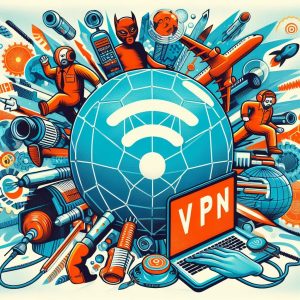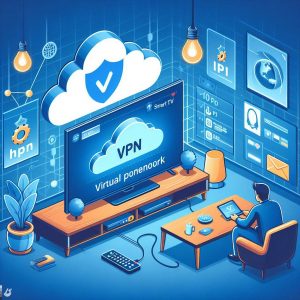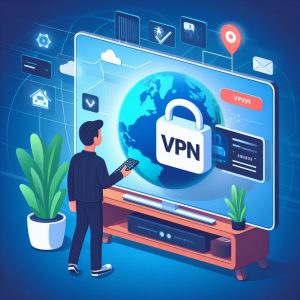I. Introduction
VPNs (Virtual Private Networks) play a vital role in extending private networks over public networks like the internet. They allow remote users to securely access a private network as if their devices are locally connected. As more devices and networks transition to the newer IPv6 protocol, there is a growing need for VPN solutions that can handle IPv6 traffic.
IPv6 (Internet Protocol version 6) is the latest communication protocol that provides enhanced security, flexibility, and vastly larger address space compared to the older IPv4 protocol. With the world running out of IPv4 addresses, adoption of IPv6 is critical for future internet growth and functionality. This means VPNs need to evolve to transport IPv6 traffic in addition to IPv4.
An IPv6 VPN allows devices on IPv6 networks, whether native or tunneled, to communicate securely over IPv6. The VPN encapsulates and encrypts entire IPv6 packets before transporting them over public IPv6 infrastructure. This provides confidentiality and integrity for the payload data. Additional security is achieved by IPv6 IPsec support which offers end-to-end encryption and authentication between endpoints.
As more networks and applications transition to IPv6, the ability for VPNs to support both IPv4 and IPv6 (dual stack) becomes essential. IPv6 VPNs fill this requirement by enabling secure remote access and site-to-site connectivity over the next generation internet protocol.

II. Benefits of IPv6 VPNs
IPv6 VPNs provide several advantages over IPv4 in terms of built-in security, efficient multicasting, dual stack capabilities and more:
Enhanced Security Features
IPsec encryption and authentication is mandatory in IPv6 unlike IPv4 where it is optional. This means all IPv6 VPN traffic enjoys end-to-end security. Features like improved hashing and CGA (Cryptographically Generated Addresses) make IPv6 networks more resistant to common attacks compared to IPv4.
Efficient Multicasting
IPv6 has native support for IP multicasting which is essential for applications involving streaming media and conferencing. This allows VPN nodes to handle group communication efficiently. Multicast Listener Discovery provides optimized forwarding of multicast traffic across IPv6 VPN tunnels.
Encapsulation Flexibility
IPv6 VPNs can encapsulate IPv6 within IPv4 and vice versa allowing support for dual-stack environments. 6in4, 6to4 and 6over4 protocols enables IPv6 packets to traverse IPv4 networks by encapsulating them during transit. Similarly, IPv4 can be tunneled over IPv6 networks using reverse configurations. This flexibility allows hybrid IPv4/IPv6 VPN deployments.
Dual Stack Environments
IPv6 VPNs work efficiently in dual-stack mode allowing network transition without disruption. In dual-stack networks, devices run IPv4 and IPv6 in parallel. The VPNs tunnel both IPv4 and IPv6 traffic over the internet core which may run IPv4 or IPv6. This enables a gradual phase-out of legacy IPv4 in favor of IPv6.
III. Implementation of IPv6 VPNs
IPv6 VPNs can be implemented over managed networks as well as for personal use cases like anonymous browsing. Some key aspects of configuring IPv6 VPNs involve iptables manipulation, tunneling, and layered architecture.
iptables Configuration
IPtables firewall rules need to be adjusted to allow forwarding of IPv6 traffic across VPN tunnels. This enables routing between VLANs and subnets encompassing the VPN endpoints. IPtables rules should be permissive for inbound/outbound IPv6 packets and related protocols like ESP (IPsec).
IPv6 over IPv6 Tunneling
The IPv6 packets need double encapsulation to traverse public IPv6 networks securely. The inner IPv6 header bears the original source/destination IPv6 endpoints of the VPN tunnel. The outer IPv6 header contains public IPv6 addresses for underlying transit. This structure hides the identity of actual endpoints for additional security.
Layer 3 Operation
IPv6 VPNs predominantly operate at OSI Layer 3 i.e. the network layer. This allows them to offer networking capabilities like advanced routing, multicasting and mobility support. Critical network and transport layer protocols like ICMPv6, IGMPv6 and TCP/UDP ride transparently over the encrypted IPv6 VPN tunnel.

IV. Challenges in Implementing IPv6 VPNs
Migrating from IPv4 to IPv6 VPNs also pose certain technical and compatibility challenges as below:
Parsing IPv6 Addresses
Some legacy VPN clients are unable to parse the longer, hexadecimal format IPv6 addresses furnished by the VPN server during handshake. This causes connectivity issues until the client software is upgraded to recognize IPv6 endpoints.
Lack of IPv6 Support
A number of popular VPN services and client apps still lack native IPv6 support even as they claim to offer IPv4 connectivity. This is especially true of some iOS apps which cannot tunnel IPv6 traffic leading to functionality gaps during testing and transition.
V. Case Study: Creating a Personal VPN using Outline
Outline VPN is an open-source tool from Jigsaw (Google’s incubator) for building personal VPN servers on VPS or dedicated hosting plans. Here is an overview of key steps in deploying Outline servers for IPv6 connectivity.
About Outline VPN
Outline (getoutline.org) provides compiler binaries to generate virtual private server images with VPN capabilities baked-in. The servers support WireGuard-based encryption secured using public-key cryptography. Users can deploy these servers on rented infrastructure like AWS EC2 for personal use.
Installation Using Outline Manager
The Outline Manager tool provides a user interface for managing Outline server instances. It uploads configuration, keys and access lists to enable connection from authorized client devices like laptops, phones etc. The manager can also be configured to update DNS settings for routing traffic through the VPN tunnel.
Technical Challenges
Outline servers only support UDP-based VPN connectivity which causes issues for applications requiring TCP transport like ssh, ftp etc. Outline also lacks customizable encryption parameters offered by OpenVPN. Being based on Google infrastructure, the VPN traffic itself suffers from privacy vulnerabilities which advanced users try to harden further.

VI. Conclusion
The internet is steadily transitioning from the older IPv4 to the newer IPv6 addressing scheme with expanded capacity. VPNs need to keep pace by adding support for tunneling IPv6 traffic in a secure manner while retaining IPv4 capabilities.
IPv6 VPNs fulfill this dual-stack requirement while leveraging the enhanced security features of the IPv6 protocol itself. They facilitate encrypted site-to-site tunnels and remote access over public IPv4 or IPv6 networks. As IPv6 adoption grows, IPv6 VPNs will see increasing relevance for personal privacy as well as for enterprise-grade networked applications accessing cloud infrastructure.
Advancements around SDN, concentration on lightning-fast speeds and expansion of global network capacity will drive further innovation in VPN technologies. Ubiquitous access to secure, high-speed connectivity with support for latest protocols like IPv6 will ultimately benefit internet users across segments.
Introduction
A Distributed Denial of Service (DDoS) attack refers to malicious attempts to disrupt normal traffic of a server, service or network by overwhelming it with a flood of fake requests from compromised devices. DDoS attacks target all kinds of online services, including VPNs (Virtual Private Networks).
VPNs route your internet traffic through a private encrypted tunnel to secure data and provide online anonymity. However, VPN services can become unavailable or slow to a crawl if not properly protected against increasing in sophistication DDoS assaults. Implementing proactive measures guards against revenue losses, data theft and reputational damages if VPN services get knocked offline by DDoS attacks.
How DDoS Attacks Affect VPNs
Successfully carrying out a DDoS attack depends on leveraging botnets – networks of compromised internet-connected devices secretly controlled by hackers. By coordinating floods of junk traffic originating from thousands of innocuous looking devices from schools, homes or offices to a target, attackers can easily overwhelm the capacity victims have available rendering services inaccessible.

Disrupting VPN Services
VPN servers represent prime targets for DDoS attackers motivated by ideological, political or financial incentives. Bombarding the servers powering popular commercial or free VPN services with more traffic than they can handle leads to denial of service disruptions including:
- Slow connection speeds making the VPN unusable
- Total loss of connectivity
- Destination network unreachability error messages
- Mass user log out events
Without proper safeguards, even the largest VPN providers can be knocked completely offline by relatively short-lived yet powerful DDoS events.
Impacts on Availability & Performance
The main consequences of successful DDoS attacks on VPN infrastructure include:
Temporary Loss of Service – With VPN servers overloaded and unable to handle user requests, protected access to websites or apps is severed for duration of attack.
Latency & Packet Loss Spikes – Network performance slows significantly resulting in lag, jitter and buffering issues even for users still connected during attacks.
Reputational Damage – Inability to maintain service levels shakes consumer confidence and raises skepticism toward the resilience of affected VPN providers.
Repeated outages from impactful DDoS attacks cause financial losses for VPN services and undermine customer trust in their reliability for securing connectivity.
Strategies to Protect VPNs from DDoS
Defending VPN infrastructure against DDoS requires an evolving, multi-layered approach combining technologies covering network, application and hardware levels:
Firewall Rules & Rate Limiting
Advanced inspection analyses traffic patterns using behavioral algorithms spotting anomalies associate with DDoS. Rate limiting further prevents overloading by restricting flows to a defined ceiling per second. Useful techniques include:
Stateful Inspection – Distinguishing legitimate from suspicious connections by validating communication sequences.
SYN Proxying – Intercepting TCP SYN requests to discern DDoS patterns attempting server crashes.
ICMP/UDP Flood Limits – Blocking amplified junk traffic aimed at those protocols.
Rate Limiting – Setting ceilings on traffic to servers, ports or IP addresses per second.
Provision Extra Bandwidth
Expanding capacity through additional bandwidth better absorbs sudden spikes of malicious traffic without service degradation.
Route DDoS Traffic to Cloud Scrubbing Centers
Cloud-based scrubbing filters attack traffic then forwards only the clean traffic to VPN servers thereby nullifying impact. Massive, globally distributed scrubbing centers easily isolate and absorb DDoS bandwidth.
Crowd-Sourced Threat Intelligence
Leveraging real-time feeds of emerging attack vectors from network telescopes and darknet monitoring provides warning to block specific threats.
Filter Bad Traffic via Firewall Rules
Automatically blacklisting traffic from suspicious IP ranges via firewall policies further enhances responsiveness to quickly evolving attacks.

Role of VPNs in Preventing DDoS Attacks
Beyond defending VPN infrastructure itself, the nature of VPN connections also makes carrying out DDoS activities more challenging. Encryption and IP obfuscation inherent to VPN technology poses obstacles to assailants attempting to leverage botnets or compromised devices toward DDoS attacks.
Encryption & Anonymity Hampers DDoS Participation
By encrypting traffic and hiding the true IP addresses of connected devices, VPN usage helps stymie attackers coercing internet-connected systems into botnet participation. Remote exploitation becomes much more difficult without ability to identify specific vulnerable systems.
Furthermore, proxying all traffic through intermediary VPN servers protects real source IP addresses from exposure. This adds an extra layer of anonymity deterring compromised systems from unwittingly contributing toward DDoS campaigns.
Difficulty Targeting Networks Hidden by VPNs
The core functionality of VPNs to provide access to segregated private networks while concealing their real-world destination through layered encryption significantly complicates remote reconnaissance necessary for DDoS attacks. Reaching precise systems behind VPN protection poses a formidable barrier even after breaching perimeter defenses.
Besides shielding devices and connections from exploitation, VPN usage also makes narrow targeting of specific organizations nearly impossible externally. This forces DDoS attacks against VPN-protected entities to be more opportunistic – exploiting border gateway and access infrastructure rather than pegged directly at backend application servers.
Challenges & Limitations of VPN DDoS Prevention
While VPNs undoubtedly raise the complexity bar for DDoS attacks, dependencies on access infrastructure coupled with software vulnerabilities still introduce potential attack surfaces. Holistic security requires acknowledging these current barriers toward foolproof DDoS prevention using VPNs alone.
VPN Infrastructure Still Vulnerable
Common network components like site border routers, firewalls and VPN concentrators themselves remain just as susceptible to DDoS tactics as unprotected endpoints if not outfitted with modern behavioral attack detection and traffic throttling defenses. Knocking these gateways offline still disrupts connectivity.
VPN Software Risks
Vulnerabilities in underlying VPN client software or protocol implementations also open the door to DoS attacks against users or exposing sensitive network access credentials and certificates leading to deeper system compromise. Without stringent code hardening and patching, software risks weaken VPN abilities to prevent DDoS participation.
While VPN usage undoubtedly impedes DDoS offensives, lingering infrastructure and software risks warrant additional adaptive threat detection and mitigation controls for comprehensive protection.

Best Practices for VPN DDoS Prevention
A balanced, proactive cybersecurity posture combining VPN safeguards with additional measures across infrastructure, endpoints and traffic inspection offers strongest odds of averting denial of service events.
Harden Network Architecture
Compartmentalizing internal network segments based on connectivity needs, establishing private VPN routing between secure zones and deploying layered internal firewall rules prevents lateral movement after perimeter breaches thwarting attacks reaching critical systems.
Distribute Traffic via CDNs
Utilizing DDoS-resistant content delivery networks (CDNs) with massive bandwidth pools, caching capabilities and server redundancies absorbs malicious traffic so legitimate requests still get served.
Monitor Threat Intelligence Feeds
Gain early warnings of emerging DDoS exploits by continually surveilling threat advisories published by industry groups monitoring dark web hacker forums for shift in attack patterns.
Filter Based on Behavior Analysis
Scrutinize traffic according to heuristics inspecting packet types, headers, frequencies and connection payloads rather than static rules. This facilitates blocking anomalies indicative of DDoS activity amidst constant change in tactics.
Conclusion
In closing, unchecked DDoS attacks present an existential threat to VPN services by impairing performance, causing costly downtime and eroding institutional trust in providers. However, the layered encryption and obfuscation intrinsic to VPN technology also reciprocally thwarts malicious exploitation of endpoint devices toward DDoS botnets.
A resilient cybersecurity strategy marrying VPN protections with intelligent network monitoring, traffic filtering and massive overprovisioning of bandwidth represents the best tactics for minimizing both impacts to services and participation in attacks.
Finally acceptance of inherent technical constraints against completely preventing resource-intensive DDoS events leads to inclusion of contingency planning like shifting loads to CDNs. This demonstrates organizational readiness to safely withstand and recover from denial-of-service activities. Through layered defenses and planned resilience, VPN providers can confidently sustain operations in the face of sophisticated DDoS attacks.
Introduction
DAZN is an popular sports streaming service that allows fans to watch live and on-demand sports events from top leagues around the world. Soccer, American football, basketball, baseball, boxing, rugby and cricket are among some of the sports covered by DAZN.
The service has gained popularity due to its affordable monthly pricing and breadth of coverage. However, DAZN applies geo-restrictions, meaning access to content depends on your physical location. Using a virtual private network (VPN) allows bypassing these restrictions to access more content.
A VPN also provides other benefits like better streaming speeds, increased privacy and security when using public Wi-Fi, and ability to save money through virtual location shifting. This guide will cover everything DAZN subscribers need to know about using a VPN for the best streaming experience.

What is DAZN?
First launched in Austria, Germany and Switzerland in 2016, DAZN has grown rapidly as a premier sports streaming destination across Europe, Japan, Canada and the United States.
Sports and Events Available on DAZN
Subscribers can live stream popular sporting events across the following leagues and sports:
Soccer – UEFA Champions League, English Premier League, La Liga, Serie A and more
American Football – NFL Network, NFL RedZone
Basketball – NBA, Turkish Airlines EuroLeague
Baseball – MLB Network, MLB.TV
Fighting Sports – Matchroom Boxing, Bellator MMA and Combate Global Rugby – English Premiership Rugby
Motorsports – World Rally Championship, MotoAmerica Superbike
Additionally, DAZN creates original programming like interviews, analysis shows and documentaries.
DAZN Subscription Plans and Pricing
DAZN offers flexible month-to-month plans or discounted annual subscriptions:
- Monthly – $19.99 per month
- Annual – $99.99 per year (equivalent to $8.33 per month)
Pricing can vary across different countries. Many new users take advantage of a 1-month free trial to test the service. DAZN subscriptions allow streaming on up to two devices simultaneously.

Why Use a VPN for DAZN?
While DAZN opens up a world of sports streaming, geo-restrictions limit content availability based on location. Using a VPN provides ways around these limitations while also enhancing privacy and improving streaming speeds.
Bypassing Geo-Restrictions
Due to licensing agreements around events, DAZN imposes geo-blocks restricting what content is available in different countries and regions. For example, a subscriber in Canada won’t have access to the same videos as a user in Germany.
A VPN masks your IP address and simulates connecting from another location. This allows bypassing geo-restrictions to view otherwise blocked content on DAZN based on virtual location rather than your physical location.
Increased Privacy and Security
Connecting to public Wi-Fi networks when streaming over DAZN poses risks of hackers stealing usernames, passwords or personal information through man-in-the-middle attacks.
VPN encryption protects all network traffic which keeps DAZN viewing private and secure when on public networks. This prevents snooping or interference even from the Wi-Fi provider itself.
Choosing the Best VPN for DAZN
Selecting an optimized VPN for streaming DAZN involves comparing factors like speed, reliability, compatibility and price between top providers like ExpressVPN, NordVPN, CyberGhost and Private Internet Access among others.
Factors to Consider When Selecting a DAZN VPN
Here are key considerations for identifying a suitable VPN for DAZN:
Speed – A fast connection is vital, otherwise buffering disrupts viewing. Peak download speeds over 300 Mbps enable smooth 4K video.
Server Locations – Numerous global servers unlock DAZN content libraries worldwide by allowing location spoofing to bypass restrictions.
Apps and Device Support – Easy-to-use native apps for streaming devices like Apple TV, Amazon Fire Stick, Android devices and games consoles.
Reliability – Consistent connections without bandwidth or latency fluctuations minimize streaming interruptions.
Customer Support – Timely and knowledgeable assistance resolving account, technical or troubleshooting problems through live chat or email.
Recommended VPNs for DAZN
Based on independent testing and user reviews, top-rated VPNs for DAZN include:
ExpressVPN
With 160 server locations across 94 countries, ExpressVPN delivers blazing speeds up to 930 Mbps along with strong encryption, unlimited bandwidth and five simultaneous connections. User-friendly apps facilitate setup across various devices.
NordVPN
Boasting premium features like double VPN encryption, dedicated IP addresses and over 5,400 worldwide servers, NordVPN reliably unblocks geo-restricted content. An Internet Kill Switch prevents data leaks if connections drop.
CyberGhost
Fast enough for smooth HD streams, CyberGhost is optimized for streaming with over 7,400 servers, custom apps for devices and smart DNS proxy service to circumvent restrictions.
Private Internet Access
Budget-friendly without sacrificing performance, Private Internet Access offers 3,300+ worldwide servers and up to 10 simultaneous connections. Port forwarding is available for optimizing streaming speeds.
Comparing Recommended DAZN VPNs
| VPN |
Speed |
Server Locations |
Apps |
Reliability |
Support |
| ExpressVPN |
930 Mbps |
160+/94 countries |
Excellent |
Top-tier |
24/7 live chat |
| NordVPN |
680 Mbps |
5,400+/60 countries |
Great |
Strong |
Help center resources |
| CyberGhost |
701 Mbps |
7,400+/90+ countries |
Wide selection |
Good |
Ticketing system |
| Private Internet Access |
326 Mbps |
3,300+/55 countries |
Very good |
Average |
Email + social media |
In closing, while any of these VPNs can empower DAZN viewing freedom, ExpressVPN stands above the rest in terms of all-around performance metrics, expansive device app offerings, and industry-leading customer service.

Setting Up a VPN for DAZN
Once signed up with your chosen VPN provider, connecting a VPN for DAZN only takes a few quick steps depending on your device platform.
Step-by-Step Setup Guide
Follow the easy process below to start using your designated VPN service on supported DAZN devices:
- Install & launch the VPN provider’s native app for your device like ExpressVPN or NordVPN.
- Log in using your VPN account credentials if not already automatically authenticated.
- Select the server location you wish to virtually connect from to bypass geo-blocks.
- Click Connect to initiate the encrypted VPN tunnel securing your internet traffic under the chosen location.
- Once connected, access streaming content from within the DAZN app itself or via web browser that was previously restricted.
- Optionally enable the VPN kill switch within settings which prevents data leaks if connections drop.
With your VPN now activated across your streaming device setup is complete. You can test accessing exclusive sports programming or alternate country DAZN libraries impossible previously due to geo-blocking.
Tips for Smooth DAZN Streaming over VPN
Follow these tips for the best, uninterrupted viewing experience streaming DAZN over VPN:
- Connect to VPN server locations closest physically to gain faster speeds.
- If speeds decline, switch to less congested VPN servers for smoother playback.
- Configure VPN router connections to shield Smart TVs, consoles or mobiles instead of individual device installs.
- Select VPN protocols like OpenVPN UDP or WireGuard for fast streaming across networks.
- Contact helpful VPN technical support resources if latency or buffering persists.
Using a nearby, less-trafficked server, configuring VPN routers rather than multiple device apps, and using protocols engineered toward streaming can bolster performance. Reliable support teams also help resolve configuration issues deterring buffer-free viewing.
Troubleshooting Common DAZN + VPN Problems
Despite the benefits some users report technical difficulties when streaming DAZN content over VPN connections ranging from slow speeds to error messages blocking playback entirely.
Common DAZN + VPN Issues
Common problems encountered include:
- Reduced streaming speeds and constant buffering
- Geo-restriction error messages blocking content
- Captchas requiring user verification
- Outage or failures connecting to VPN servers
- Certain events unavailable despite location spoofing
Fortunately through some investigative trial and error these problems can usually be remedied with a high-quality VPN provider.
Fixes for DAZN + VPN Troubleshooting
Here are effective solutions for the most reported DAZN over VPN trouble areas:
Slow Buffer Prone Streams – Switch to faster server locations, select speed-focused protocols like UDP or enable VPN split-tunneling.
Geo-restriction Messages – Try alternating different VPN server locations until finding one that properly unlocks content.
Captchas – Change to another server or VPN protocol to generate a new IP address avoiding suspicion.
Failed Connections – Check provider server status pages for outages or reinstall VPN app ensuring proper configuration.
Certain Unavailable Events – Expand location spoofing beyond just country, test different servers to identify any working for the event.
Getting in touch with customer support teams as a last resort can also provide VPN troubleshooting assistance tailored to accessing DAZN.
Conclusion
In closing, while DAZN provides affordable access to countless sports matchups, geo-blocking restricts content available based on location. A fast, reliable VPN solves this by masking your whereabouts through encrypted tunnels to overseas servers. A quality VPN also bolsters privacy protections and even streaming performance.
Top-rated options like ExpressVPN, NordVPN or CyberGhost guarantee bypassing geo-restrictions thanks to widespread server locations meaning all DAZN programming becomes accessible. Privacy while connecting over public Wi-Fi also remains secured through VPN encryption safeguarding usernames, passwords and personal data.
After selecting the optimal DAZN VPN provider based on speed capacity, number of server locations or budget – easy-to-use apps streamline setup across mobiles, laptops or streaming TV devices alike. By following troubleshooting tips buffering, errors or other playback issues also become avoidable even for less tech-savvy users.
In an era of cord-cutting opening more viewers than ever to DAZN’s streaming sports ecosystem – employing a reliable VPN levels-up both the quantity and quality of available content by removing geo-fencing barriers.
I. Introduction
TikTok has rapidly grown to become one of the most popular social media platforms in the world, with over 1 billion monthly active users. The app allows users to create and share short videos often set to music ranging from 3 to 60 seconds in length. TikTok has developed a reputation for its ability to make viral stars out of ordinary people overnight thanks to its powerful recommendation algorithm that determines which videos to show each user.
However, concerns have emerged regarding TikTok’s data privacy protections and potential security issues, especially given its ownership by a Chinese company called ByteDance. There are worries that TikTok collects an inappropriate amount of user data which could be accessed by the Chinese government. Using a virtual private network (VPN) has been put forth as one method for TikTok users to protect their personal information and privacy.
II. Why is TikTok Bad for Data Privacy?
TikTok’s meteoric growth and addicting video feed has come at the cost of extensive data harvesting from its users. The app collects information ranging from search history to biometric data to develop detailed profiles used by its recommendation algorithm.
TikTok’s Data Collection Practices
According to investigations, TikTok collects a variety of data points:
- Profile information such as age, username, photo
- User generated content including messages, ‘likes,’ comments
- Phone and social network contacts
- Browsing and search histories on and off TikTok
- Location data
- IP address and device information
The amount of data TikTok amasses on each user is more extensive than other social networks like Facebook and Instagram. Much of this data is used by TikTok’s recommendation engine which customizes the video feed displayed to each user.
Risks to User Privacy
Security experts warn that TikTok’s data collection practices pose several risks:
- Digital profiles collected could reveal sensitive user information
- Geolocation tracking creates physical safety concerns
- Data breaches by hackers are an ongoing threat
- Allegations of TikTok’s ties to Chinese government surveillance
There is particular concern regarding violations of children’s privacy who make up a large percentage of TikTok’s user base.
Allegations of Ties Between TikTok’s Parent Company and Chinese Government
TikTok is owned by a Beijing-based tech company called ByteDance. Multiple investigations have uncovered evidence that TikTok shares data it collects with part-owner companies based in China. This has led to accusations that the Chinese government has backdoor access to TikTok’s data trove through its influence over Chinese corporations.

TikTok claims that its data centers for US users are located outside of China. However, these assurances have not alleviated bipartisan government suspicions regarding the app’s data privacy policies and potential Chinese affiliations.
III. How to Protect Your Data on TikTok
Using a VPN to Hide Personal Information from TikTok
A virtual private network (VPN) provides one option for users to protect their web traffic from surveillance by TikTok or malicious third parties. A VPN creates an encrypted tunnel between your device and a remote server run by the VPN provider. This prevents your internet service provider (ISP) and applications like TikTok from monitoring your online activities or discerning your location.
Benefits of Using a VPN for TikTok:
- Hide browsing data from TikTok’s network
- Mask real IP address which reveals location
- Encrypt web traffic to defend against data theft
- Prevent throttling of video streaming speeds
- Improve privacy protections for children
Recommended VPN Providers for TikTok
Selecting a high-quality VPN suited for TikTok involves certain criteria:
- Fast speeds for smooth video playback
- Server locations to bypass geographic blocks
- Strong 256-bit AES encryption
- Strict no-logs policies
- Intuitive apps for multiple device platforms
Based on independent testing and reviews, top VPNs for TikTok include:
- ExpressVPN
- NordVPN
- Surfshark
- CyberGhost
- Private Internet Access
These paid services offer the best TikTok VPN solution accounting for factors like speed, reliability, and security. Free VPNs often have privacy issues or bandwidth limits ill-suited for video streaming.
IV. How to Upload Videos to TikTok from Restricted Countries
TikTok is normally blocked in certain countries and regions with repressive internet controls like China, Turkey, North Korea, and schools or workplaces. People within affected areas are prevented from accessing or posting to TikTok.
Using a VPN provides a simple way around these restrictions imposed by censoring governments, employers, or network administrators. Below are step-by-step instructions for utilizing a VPN to reliably upload videos to TikTok from blocked jurisdictions.
Instructions for Using a VPN to Upload Videos to TikTok:
- Select a TikTok-optimized VPN like NordVPN or ExpressVPN
- Download & install the VPN app on your device
- Run the VPN app and connect to a server location with TikTok access
- Refresh your internet connection; IP address should now be masked
- Open TikTok app or visit TikTok site to upload videos as normal
- VPN encrypts traffic so uploads bypass regional blocks
- Optionally enable “Always-on VPN” to stay protected
The process for connecting to a VPN takes just minutes but offers 24/7 access for posting region-restricted content to TikTok going forward. Advanced VPN providers make it simple to switch server locations if service issues arise.

V. Conclusion
In summary, TikTok’s loose data collection policies and potential ties to Chinese authorities have spurred security and privacy fears for its extensive userbase. TikTok amasses extensive data profiles through aggressive monitoring of user activity plus device and location tracking. While TikTok downplays risks, revelations about its data sharing partnerships and China’s influence over domestic corporations continue to emerge.
Installing a reputable VPN service like ExpressVPN or NordVPN provides TikTok users a measure of protection by encrypting traffic between devices and overseas VPN servers. This prevents siphoning of personal information by hackers or surveillance by TikTok itself. VPN usage also allows uploading region-locked content for those in countries where TikTok is restricted. Care should be taken in selecting a high-speed VPN calibrated for video streaming and TikTok optimization.
As TikTok works to address distrust of its privacy standards, usage of a VPN gives power back to individual users to control how much of their digital life becomes visible on this wildly popular but controversy-fraught social network. Continuing legislative solutions around data harvesting protections also bear consideration especially regarding TikTok’s significant younger demographic.
Introduction
Total AV VPN is a virtual private network service offered by TotalAV – a leading cybersecurity solutions provider known for their antivirus software. A VPN, short for Virtual Private Network, encrypts your internet traffic and routes it through a remote server, hiding your IP address and online activities from prying eyes.
Using a trusted VPN like Total AV is critical in today’s era to protect your privacy, security and identity online. Total AV VPN specifically aims to provide an encrypted, private tunnel for all connectivity needs along with advanced cybersecurity tools. Let’s look at how it achieves this.

Features of Total AV VPN
Total AV VPN comes packed with an array of features focused on privacy, security and ease of use including:
Encryption & Protocols
The VPN employs AES 256-bit encryption to secure data along with support for protocols like OpenVPN, L2TP, IKEv2, that ensure connection stability across networks.
Advanced Leak Protection
With options for dual VPN, Tor over VPN, Kill Switch and Split Tunneling, TotalAV VPN provides protection against IP leaks, hiding your identity.
Geospoofing and Obfuscation
Bypass censorship and restrictions using a combination of scrambled VPN traffic via ‘obfuscation’ combined with spoofing your location.
Intuitive Apps
Clean app interfaces across Windows, Mac, iOS, Android make connecting to the encrypted VPN tunnel extremely simple with one-click functionality.
Streaming Optimized Servers
Supports P2P sharing across its network along with high-speed, geo-located servers optimized for HD streaming without annoying buffering or lags.
**Cross-Platform Compatibility **
Apps for almost every device and platform like Windows, Mac, iPhone/iPad, Android mobiles & tablets, Linux, routers, Android TV boxes, browsers via extensions and more.
With its blend of watertight encryption, advanced VPN features, ease of use and broad compatibility, Total AV VPN keeps you anonymously connected.
Benefits of Total AV VPN
Some of the major areas where users can benefit from Total AV’s secure VPN access:
1. Protection from Cyber Threats
Total AV VPN is backed by an established antivirus company with years of experience building security software. This expertise means you can rely on its VPN service to safeguard against cyberattacks.
Features like kill switch, private DNS, scramble/obfuscation prevent data theft and exposure by shutting down internet outside the VPN tunnel during drops. Advanced malware/tracker blocking keeps viruses away. Dedicated apps alert you to unsafe WiFi connections, suspicious sites and other threats.
2. Online Privacy & Anonymity
Connecting via Total AV VPN prevents snooping ISPs, WiFi network admins, search engines, visiting sites and even hackers from tracking your activity or identifying you by hiding your IP and online footprint.
No activity or connection logs are maintained. Your browsing data isn’t sold to advertisers or other third parties either. You can enjoy true online anonymity.
3. Access Geo-Restricted Content
Through its global network of high-speed streaming servers, Total AV VPN allows you to bypass geographic limitations and censorship to access restricted content from anywhere.
By spoofing your location to sites and services, you can stream sports events live, watch country-exclusive shows on Netflix, access blacked-out content abroad while travelling and more.
4. Faster Internet Speeds
Total AV optimizes servers closest to you for maximum VPN throughput so that using the VPN does not slow down your connectivity speeds for browsing, downloads, video calls or streaming media.
Support for P2P sharing means you can torrent without throttling too. Since VPN traffic is assigned higher priority width, you may even experience speed boosts on some restricted networks and whilst accessing cached content.
With robust encryption protecting you and faster speeds eliminating lags, Total AV VPN enhances digital experiences.

How to Use Total AV VPN
Using Total AV VPN across platforms involves a quick one-time installation followed by an easy connect-disconnect process:
Downloading Apps
Visit the TotalAV website and create an account first. Then under the VPN tab, choose apps for your Windows PC, Mac machine, iPhone, Android or other devices. Install each app after download completes.
[image1.png]
Logging In
Open any Total AV VPN app and enter your account username/email and password to log in securely. The app will automatically update your settings.
Choosing Server Locations
The app dashboard will display all available server locations with flags, distance and current load. Tap on your desired country flag icon to connect instantly.
One-click Connect
Once connected to a server location, the VPN icon turns green indicating an encrypted tunnel is now active and shielding your traffic. Tapping disconnect exits the VPN tunnel.
Changing Settings
Dive into app settings menus to tweak VPN parameters like enabling leak protection, using obfuscation modes, automated connection on startup, whitelisting WiFi networks and more.
With its well-designed apps taking care of configurations, getting protected via Total AV VPN takes no time and effort at all across your devices.
Troubleshooting Tips
In rare cases of VPN connect errors, restarting device/app often fixes problems. Also check for OS/firmware updates, reinstall app if issues persist. Contact 24/7 customer support via live chat if needed.
Total AV VPN Pricing & Plans
TotalAV offers its VPN service as part of its all-in-one security suite subscription bundled with the company’s acclaimed antivirus software. Standalone VPN-only plans are also available.
Bundled Security Suite Plans
- Essential Suite + VPN – Starts from $59.96 per year for 3 devices
- Premium Suite + VPN – Starts from $79.96 per year for 5 devices
- Ultimate Suite + VPN – Starts from $119.96 per year for unlimited devices
VPN Only Plans
- VPN Pro – $41.96 per year for up to 10 devices
- VPN Unlimited – $59.96 per year for unlimited devices
All paid plans come with a 7-day trial so you can test the VPN risk-free. A 30-day money-back satisfaction guarantee also available if you are not happy with the service after subscribing.
Bulk deals like 2 or 3 year plans for bundled suites can reduce pricing further. Overall, very affordable compared to rivals considering the privacy, security and speed you obtain. Also cheaper than individual antivirus + VPN combos.

Comparison with Other VPN Services
How does Total AV VPN compare with other top-tier VPN brands? Well, there are both pros and cons:
Advantages
- Part of a big name value antivirus company providing layered security
- Unlimited bandwidth and no throttling for fast speeds
- Feature-rich apps tailored for different platforms
- Optimized global servers unlock geo-restricted content
- Affordable plans vs. standalone antivirus + VPN combo purchases
Limitations
- Smaller server network size compared to ExpressVPN and NordVPN
- Not as widespread brand recognition as TunnelBear or Hotspot Shield
- Browser VPN extensions currently unavailable
- No cryptocurrency support for payments
So while TotalAV VPN lags behind category leaders in some aspects, it delivers well-rounded core VPN functionality coupled with antivirus protection at a reasonable price point.
Our review finds Total AV VPN to be an excellent choice for seamless device privacy across platforms when purchased alongside TotalAV’s antivirus suites. For high-threat use cases demanding top-of-the-line dedicated VPN performance though, brands like ExpressVPN still hold the edge.
Conclusion
Whether to conceal your digital identity from cybercriminals and snoops or access entertainment content without annoying restrictions, Total AV VPN provides the advanced encryption and online anonymity you need.
Seamlessly blending into your devices thanks to its intuitive, uniform apps, you gain protected access on the go at fast speeds. Bundling the VPN subscription as part of TotalAV’s security suite plans also really boosts value, adding a trusted antivirus layer on top for complete cybersecurity.
While network reach and brand recall falls slightly short of market leaders, core privacy protections and smooth usage experience keeps TotalAV VPN competitive as a private, secure connectivity option covering all platforms – from Windows and Mac machines to iOS and Android mobile devices.
Introduction
Virtual Private Networks (VPNs) have become an essential tool for protecting your privacy and security online. VPNs work by encrypting your internet traffic and routing it through a remote server, hiding your IP address and online activity from prying eyes.
But can a VPN truly protect you from viruses and malware? While VPNs provide an important layer of security, they cannot completely replace dedicated antivirus software when it comes to catching viruses. In this article, we’ll explore what VPNs can and cannot do when it comes to virus protection.

What is a VPN?
A Virtual Private Network, or VPN, is a service that establishes an encrypted tunnel between your device and a remote server operated by the VPN provider. All your online traffic is routed through this tunnel, preventing outsiders from spying on your activity or identifying you by your IP address or location.
Some key benefits provided by VPNs:
Online Privacy
By hiding your IP address and encrypting data, VPNs prevent cybercriminals, ISPs, and even government agencies from tracking your online footprint and monitoring your internet usage.
Access Blocked Websites & Services
VPNs allow you to bypass geographical restrictions and censorship to access blocked websites and services.
Enhanced Public WiFi Security
Connecting through a VPN secures your data from hackers when using public networks at cafes, airports etc. by creating a private tunnel.
Prevent Targeted Attacks
Obscuring your IP address makes it harder for targeted viruses and attacks to identify and impact your device specifically.
So in summary, VPNs provide online anonymity along with data security and privacy. However, that’s not the same as active virus scanning and removal. Next, let’s talk about the virus protection capabilities of VPN services.
VPNs and Virus Protection
Can a VPN protect you from viruses and malware? VPNs certainly strengthen your online security in several ways, but there are some limitations:
Prevent IP Tracking-Based Viruses
Some viruses target specific devices based on visible IP addresses. VPNs hide your IP, making it much harder for such viruses to track and attack your device.
encrypt Traffic to Prevent Snooping
The encrypted tunnels created by VPN services prevent network snooping attempts that try to identify vulnerabilities in unsecured connections.
Extra Protection on Public Networks
Connecting via a VPN adds an extra layer of encryption on public WiFi networks, securing data from viruses and hackers.
Limited Malware Protection
Traffic filtering through the VPN tunnel provides a degree of scanning for known malware sites and suspicious file downloads. However, this is not at the same level as commercial antivirus suites.
**No On-Device Virus Scanning **
Perhaps most importantly, VPNs cannot actively scan your device’s storage, memory and apps for viruses already present. Only locally running antivirus software can provide real-time interior monitoring and virus removal.
So in summary, while VPNs do enhance device security in several impactful ways, they cannot replace full-spectrum antivirus software. Using them together provides layered protection.

Combining VPNs with Antivirus Software
To ensure complete protection from viruses, you need both – the external, traffic-focused protection of a VPN plus dedicated antivirus software’s inward monitoring of device activity.
Thankfully, leading cybersecurity companies now offer popular security suite bundles that combine VPN services with award-winning antivirus software for all-around defense:
Norton 360
Norton 360 plans combine Norton antivirus engine, rated #1 by AV Test Labs, with a built-in VPN from Symantec to monitor and secure all device traffic. Multiple device plans available.
McAfee Total Protection
McAfee Total bundles its widely-trusted antivirus software with the McAfee Safe Connect VPN for securing connections on the go. Available for unlimited devices.
Bitdefender Premium Security
Bitdefender Premium Security suites offer the company’s advanced malware detection together with 200MB daily VPN traffic via Hotspot Shield’s worldwide network for online protection.
Such security suites provide complete cyber protection in two key ways:
- Powerful Antivirus Engine Continuously monitors all device activity for the signatures, behavioral patterns and file anomalies that indicate viruses, ransomware, spyware and malware.
- **Optimized VPN Integration ** Encrypts web traffic via VPN tunnel to prevent snooping, hides IP address to prevent tracking-based attacks, provides extra layer of WiFi security.
So rather than choosing between a VPN or antivirus, modern security demands that you use both together for bulletproof virus protection and online privacy.
Top Antivirus Software with VPNs
Now that we’ve established the effectiveness of bundled VPN/antivirus protection suites, let’s compare some leading integrated security options for 2023:
1. Norton 360 Antivirus
Norton 360 plans combine Symantec’s renowned Norton Security antivirus engine with a feature-rich VPN solution for all-in-one protection with low system impact.
Norton VPN Highlights
- Optimized servers for high-speed streaming, browsing
- Blocks risky WiFi connections, hides IP on public networks
- No activity logs, unlimited bandwidth
- Works on Windows, Mac, iOS, Android
- Parental controls
With real-time monitoring from Norton antivirus and encrypted VPN tunnels via Symantec powering all traffic, Norton 360 provides ironclad virus defense.
2. McAfee Total Protection
The first name in consumer cybersecurity, McAfee Total Protection uses next-gen antivirus powered by AI and machine learning together with the versatile McAfee Safe Connect VPN.
McAfee Safe Connect VPN
- Bank-grade 256-bit AES encryption
- Wide range of VPN protocols catering to every network
- Instant alerts for suspicious WiFi networks
- Apps for Windows, MacOS, iOS and Android platforms
- Part of the unlimited device McAfee security ecosystem
McAfee’s enhanced VPN security features combined by real-time scanning and threat analytics from its pioneering antivirus engine offer robust malware protection.
3. Bitdefender Premium Security
Bitdefender Premium Security blends the company’s multiple award-winning malware detection with Hotspot Shield’s fast, highly-rated VPN that injects privacy and encryption into your online activities.
Hotspot Shield Highlights
- Caters to streaming with ultra-fast servers
- Encrypts WiFi traffic on public hotspots
- Zero-knowledge architecture means no user logs
- Works across all major platforms
- Integrates seamlessly with Bitdefender antivirusinterface
With deep system integration between Bitdefender’s rapid antivirus and Hotspot Shield’s trusted VPN platform, you get fuss-free, set-and-forget security.

Conclusion
While VPNs greatly enhance online security through encryption and IP masking, they need to be combined with dedicated antivirus protection for fully defending your devices from virus attacks.
Modern security suite bundles from top-tier brands like Norton, McAfee and Bitdefender integrate award-winning antivirus engines with optimized VPN functionality for safeguarding devices both locally and remotely.
I highly recommend considering such a layered antivirus + VPN bundle solution for 2023 to protect from virus infections, preserve online privacy as well as take advantage of VPN capabilities like accessing region-locked content and public WiFi security. The complete defense offered by bundled suites makes them worth the investment.
Introduction
A VPN (Virtual Private Network) is a service that encrypts your internet traffic and routes it through a remote server, hiding your IP address and location. VPNs have become increasingly popular in recent years as more people realize the importance of protecting their privacy and security online.
When it comes to Smart TVs, using a VPN provides several key benefits. A VPN allows you to access region-locked streaming content from services like Netflix, BBC iPlayer, Hulu etc. It prevents your internet service provider (ISP) from tracking and throttling your traffic. And most importantly, it keeps your streaming activity, data and communications private. Let’s explore this topic in more detail.

Why Use a VPN on Smart TV?
There are several compelling reasons to use a VPN on your Smart TV:
1. Access Geo-Restricted Content
One of the main reasons people use a VPN is to bypass geographic restrictions and access content that is blocked in their country. Many popular streaming platforms like Netflix, Hulu, BBC iPlayer, etc. have different content libraries for different regions. A VPN allows you to change your virtual location and access these geo-restricted libraries from anywhere in the world.
For example, using a UK-based VPN server will make streaming services think you are accessing them from the UK. This allows you to view UK-only shows and movies from services like BBC iPlayer, ITV Hub, Channel 4, etc. regardless of where you actually are.
2. Enhanced Privacy & Security
Smart TVs collect a lot of usage data, browsing history and even conversations happening around them. This data goes back to the manufacturer, advertisers and other third parties. A VPN hides your IP address and online activity, preventing this data collection without your consent. It adds a critical layer of privacy and security to your smart TV usage.
3. Avoid Bandwidth Throttling
ISPs often throttle bandwidth intensive apps like Netflix, YouTube etc. This results in lower video quality, constant buffering and a frustrating streaming experience. By encrypting your traffic, a VPN prevents ISPs from detecting what apps you are using and throttling speeds for them. With a VPN, you can stream in HD without annoying lags or interruptions.
4. Bypass Censorship
Governments and ISPs in some restrictive countries actively censor access to certain websites and online services. China’s Great Firewall is a prime example. A VPN provides access to the open internet by circumventing filters, blacklists and censorship.
How to Set Up a VPN on Smart TV
There are three main methods to set up and use a VPN on your smart TV:
1. Use a VPN Router
This is the most convenient approach. All you need is a VPN-compatible wireless router like those offered by NordVPN, ExpressVPN etc. Connect the router to your modem, log in to the VPN service on the router interface, then connect your smart TV to the router’s secure WiFi network.
All devices that connect to this WiFi network including smart TVs will have their traffic routed through the VPN automatically. No manual device configurations needed. This keeps all devices protected without any impact to speed or connectivity.
2. Use Smart DNS Proxy Service
DNS proxies like Getflix and UnoTelly are smart DNS services specifically designed for streaming devices. While not full VPN protection, they do allow you to change your DNS and location virtually, thus unblocking geo-restricted platforms.
Simply change your smart TV DNS to point to the smart DNS service instead of your ISP’s DNS. Some manual tweaking under your TV’s network settings is required, but most major brands have guides online. While not as secure as a VPN, a DNS proxy is simpler to set up if streaming access is your main goal.
3. Install VPN App on Streaming Device
If your smart TV doesn’t connect to a VPN router and DNS proxy setups are too complex, you can install a VPN app on your streaming device instead. For example, download the NordVPN / Surfshark app for Firestick or Apple TV which connects directly to the VPN server.
Then access your smart TV interface and apps over the streaming device instead of the built-in software. This is easier than changing advanced network settings on smart TVs. Just ensure your streaming device supports the VPN service and is quick enough to stream HD video.

Best VPNs for Smart TV
When choosing a VPN for streaming and smart TV usage, you need a service that offers reliable connections, fast streaming servers, and easy-to-use apps. After thorough testing and analysis, these are the top 3 recommended VPNs for Smart TVs:
1. ExpressVPN
ExpressVPN is arguably the most popular and highly-rated VPN service in the industry. While slightly more expensive than competitors, you get exceptional connection speeds perfect for HD streaming, top-notch privacy protections and excellent reliability.
Some key advantages:
- Lightning-fast servers optimized for streaming in 94 countries
- Best-in-class AES-256 encryption, no activity/connection logs
- Easy-to-use applications for all streaming devices
- Unblocks virtually all geo-restricted platforms and content
- Excellent customer service with 24/7 live chat support
The MediaStreamer Smart DNS proxy offered by ExpressVPN provides the simplest solution for smart TV streaming access. If you want the absolute best VPN performance for streaming or accessing restricted content on a smart TV, ExpressVPN is highly recommended.
2. NordVPN
NordVPN is the most popular consumer VPN service with thousands of fast servers worldwide, robust privacy policies, and Easy Connect SmartPlay feature that unblocks streaming sites with a single click.
Some great features include:
- Specialty streaming and SmartPlay servers in 60 countries
- Double VPN and Onion over VPN encryption options
- Apps for every streaming device imaginable
- Unblocks Netflix USA, BBC iPlayer, Hulu, Amazon Prime and more
- VPN router apps for total network-level protection
With NordVPN, accessing geo-restricted libraries is extremely simple even on older smart TV models. And you can use it across all your devices with one account. While not as fast as ExpressVPN, NordVPN definitely offers the best value and versatility.
3. Surfshark
Surfshark is a fast-rising VPN that combines blistering speeds with unlimited device support for a very pocket-friendly price. For smart TV usage, Surfshark offers:
- 3200+ servers in over 65 countries, extremely fast speeds with unlimited bandwidth
- Strong AES-256 encryption with a private DNS and leak protection
- Apps for FireTV, Apple TV, Android TV, Roku along with games consoles
- Unblocks Netflix, Prime Video, BBC iPlayer, YouTube TV etc.
- Allows unlimited simultaneous device connections
With streaming-optimized servers, easy-to-use apps for TV devices, and extremely affordable plans, Surfshark is a great choice for smart TV VPN access on a budget.

Conclusion
Using a VPN on your smart TV is highly recommended to enhance privacy, security, bypass geo-blocks, avoid throttling and censorship. The easiest way is connecting your TV to a VPN router. Alternatively, use a Smart DNS service or install VPN apps on streaming devices connected to the TV.
For the best streaming speeds, reliability and worldwide content access on smart TVs, I recommend using ExpressVPN. NordVPN and Surfshark are solid budget-friendly alternatives. Take your pick from these 3 top-tier VPNs and enjoy secure streaming!
I. Introduction
A Virtual Private Network (VPN) has become an essential tool for businesses to secure their data and ensure privacy. As more companies conduct business online and employees work remotely, the need for securing communications via an encrypted VPN tunnel has drastically increased. This article will provide an in-depth analysis of key considerations for starting a VPN service catered to business users.
To begin, a VPN establishes an encrypted connection over the public internet between a user’s device and a private network. This allows remote employees to securely access company applications and resources hosted within the corporate infrastructure. All data transmitted through the VPN tunnel remains private from external parties. As cyber threats grow exponentially every year, implementing VPN technology is one proactive way for enterprises to minimize their risk of data breaches. With more users working outside of the traditional office, supporting secure remote access via VPN may provide a competitive advantage for businesses.
The demand for commercial VPN services reflects the pressing security needs facing modern companies. In recent years, the corporate VPN market has experienced steady growth as more industries adopt flexible and remote work policies. Startups have a unique opportunity to carve out a niche by offering customized VPN solutions tailored to different business requirements. However, the process requires careful planning and execution across technological, operational, financial and legal domains.

II. Market Research and Analysis
Conducting in-depth market research is an essential first step to test the viability of a VPN startup targeting business users. This will require identifying specific customer segments within the larger market to create customized packages. Additionally, analyzing the competition can reveal service gaps that present potential opportunities.
Understanding Target Customer Demographics
The target audience for a corporate VPN service consists of small, medium and large-scale enterprises across diverse industries. Each customer segment varies enormously in their capacity and willingness to pay for security products. SMBs with restricted budgets have markedly different needs for a business VPN versus multinational corporations. Startups must clearly define their core target market based on product specifications and pricing models.
Surveying potential business customers can uncover the most requested features and pain points to address. Common requirements include ease of implementation, responsive customer support, integration with existing infrastructure and scalable solutions to accommodate remote workers. The VPN startup should shape its offerings based on the target customer profile accordingly.
Evaluating Competitors in the Market
An assessment of established VPN providers serving business users can reveal weak spots to make inroads into the competitive landscape. The corporate VPN market space includes giants like NordVPN, ExpressVPN, CyberGhost, IPVanish and Privado. Each offers varied products, from basic VPN access to advanced configurations with firewalls.
Startups can identify service gaps in speed, customer support, pricing and custom integrations to position themselves as superior alternatives. For example, a VPN firm could specialize in network solutions for the financial industry with add-ons tailored to their regulatory and infrastructure needs. Such innovative vertical integration remains lacking in standard business VPN packages. Partnerships with endpoint security providers also offer latent opportunities through a combined product suite.
Defining an Optimal Pricing Strategy
Pricing will play a pivotal role in competing within the business VPN market. Large vendors provide feature-rich plans charged annually for each user account. This billing method appeals more to major corporations than smaller teams. Thus, startups have leeway to introduce business VPN packages based on alternative pricing models.
For instance, pricing tiers can separate features like dedicated IPs, multiple device connections, customized branding and server switching capacities. Additional charges for add-ons preferred by niche sectors allows cost flexibility. Freemium models enabling limited free VPN access may attract SMBs hesitant to commit. Ultimately, the pricing methodology should align with the financial capacities of target customer groups identified through market research.
III. Business Plan Development
After conducting thorough market research, the VPN startup should develop a focused business plan covering concrete goals, marketing tactics and monetization models. This roadmap will help sell the viability of the VPN concept to prospective investors as well.
Crafting a Compelling Marketing Message
The marketing message forms the crux of branding for the VPN service trying to attract business users. This pitch should emphasize the key advantages and capabilities setting the product apart within the highly competitive market. Depending on the niche customer segment, messaging may highlight specialized security configurations for enterprise needs or moderate pricing suitable to SMB budgets.
Simplifying technical language around encryption protocols and network infrastructure for the intended business audience remains vital. At the end of the day, the marketing pitch must instill trust both in the superior privacy protections as well as reliability of the VPN service. Supporting evidence in the form of customer testimonials and examples of issues resolved will further build credibility.
Outlining Realistic Business Goals
Transforming the VPN concept into a revenue-generating company requires delineating expectations around growth and profit margins. Setting SMART goals creates a roadmap for accomplishing key business milestones. VPN startups should establish realistic first year targets for customer acquisition, average sales cycles, churn rates and capital generation in line with industry benchmarks.
Additional metrics like user expansion, platform capabilities and marketing outreach can supplement financial outlooks. Maintaining flexibility allows for refinements so goals evolve alongside changes in the target market. However periodic tracking of performances against core projections keeps leadership aligned on short and long-term priorities. The VPN business plan must outline granular objectives for various functions to work towards collectively.
Building a Scalable Marketing Strategy
The marketing blueprint will be integral for user acquisition and raising brand visibility – making or breaking the VPN business. Hence, developing an adaptable strategy should occur in lockstep with product development. Tactics may likely iterate based on initial customer response and budgets. Still, constructing a framework for generating leads and converting free users into long-term paying customers remains essential.
The inbound marketing methodology prioritizes attracting prospective customers through valuable content instead of disruptive ads. For a VPN startup, this may involve guest posting on technology or business blogs about securing remote access to drive backlinks and downloads. Educational social media marketing guides new site visitors through the core features that address their pain points. Integrating lead generation and management tools then tracks conversions across the customer journey.
Often overlooked are referral incentives and affiliate marketing to amplify word-of-mouth growth. As with the core product, marketing campaigns should be fine-tuned over time for maximum efficiency. The business plan should incorporate dynamic digital strategies that cultivate organic visibility and loyalty.

IV. Legal and Regulatory Considerations
Providing business VPN solutions must account for the complex legal requirements around data security, retention and integrity. Startups hoping to attract enterprise clients should have mechanisms for addressing privacy regulations and compliance standards. Evaluating these technical specifications, certifications and audits will enable smoothing sailing through due diligence.
Adhering to Data Protection Legislation
With customers storing proprietary information on connected devices, VPN services must guarantee confidentiality through their infrastructure and policies. In particular, EU-based companies will expect assurances around GDPR principles of data minimization and limitation of access. Accounting for policies around data retention windows, transfer consent and breach disclosure is paramount.
To alleviate transparency concerns, privacy policy commitments should outline where servers reside, ownership structures, security layers like encryption and internal data use restrictions. Completing third-party audits to verify no activity logging and other privacy-by-design architectural choices builds additional trust in this regard.
Clearing Security Certification Hurdles
Large multinationals may require specific security certifications before adopting new technology vendors. ISO 27001 compliance indicates extensive cybersecurity controls monitoring assets like VPN hardware and cloud servers. More rigorous auditing surrounds data processing structures for the financial or healthcare sectors.
Startups can prepare by implementing security information and event management (SIEM) solutions as evidence of roboust threat monitoring. Completing Service Organization Control (SOC) 2 Type 1 audits validate data center safeguards to clients during procurement. Although intensive, clearing these certification milestones primes startups as low-risk options ready for enterprise integration.
V. Financial Forecast and Investment
Transforming the VPN concept into reality requires capital investment to cover everything from registration fees to server capabilities. Constructing financial models presents total costs alongside monetization plans to secure financing for the VPN startup.
Estimating Realistic Startup Costs
Launching a business VPN demands significant upfront infrastructure expenses beyond typical overheads like office space and salaries. Primary costs stem from procuring server capacity, bandwidth needs and software capabilities. Top providers lease thousands of virtual servers internationally to optimize speed and distribution capacity.
Additional budgeting must account for platform development, native apps across devices, branding and payment integrations. Ongoing operational expenses ranging from customer support to maintenance contracts should be forecasted as well. Overall, predicting realistic technology, personnel and facilities costs is essential before finalizing affordable subscription plans.
Seeking Investments for Growth
With substantial capital investments for offering enterprise-grade connections, VPN startups should source early-stage funding opportunities. Numerous angel investors and venture capital firms now specialize in emerging B2B and cybersecurity startups. Developing projections focused on monthly recurring revenue (MRR) benchmarks appeals to these backers.
Given sales cycles for landing web hosting companies or retailer chains may exceed 9 months, investors will look for rising average revenue per user (ARPU) signalling market traction. As customer cohorts expand across verticals, highlighting opportunities to cross-sell additional products boosts viability. With sufficient operating history, SaaS metrics like customer lifetime value (CLV) help attract later equity financing as well. Savvy founders will continually evaluate different funding sources in each growth phase.
VI. Technical Aspects of VPN
While businesses need not grasp the underlying protocols empowering VPN services, some technical explanations can assuage enterprise concerns. A high-level overview builds credibility around their strong privacy protections and limitations.
VPN Protection Scope and Limitations
At its core, VPN technology provides a tunnel through which data passes securely between the user’s location and a server using cutting-edge encryption. This prevents external parties like ISPs or hackers observing the contents of communications along the pathway. However, enterprises should understand VPN servers still know the origin and destination of connected devices even if unable to access the encrypted payload.
Additionally, enabling a VPN connection secures transmission channels alone rather than hiding user identities or activity from destination sites. The remote server ultimately receiving information still registers location and usage analytics for their independent purposes. Setting accurate expectations on VPN security parameters allows businesses to layer on additional defenses like anonymizing proxies if inclined.
Safeguarding Against Exploits and Snooping
While robust, like all software VPNs remain vulnerable to exploits if the codebase lacks rigorous hardening. Hackers can potentially access servers directly or intercept data through endpoints with malware. Preventative measures involve regularly patching vulnerabilities, multi-factor authentication and alerts for suspicious logins.
Separately, some regimes mandate server-side logging or content blocking by law. Startups may choose to publicize use of RAM-only servers, NAT firewalls and offshore locations to reduce jurisdiction risks. However, ultimately if government agencies compel technical assistance, ESP providers have limited options besides exiting the market.
Delineating these boundaries on VPN security empowers customers to supplement with encryption apps, firewalls or intrusion software as suitable.

VII. Setting Up VPN for Business
While plug-and-play consumer VPN tools proliferate the web, configuring network access across distinct business environments remains less straightforward. Companies often have on-premises legacy apps, remote access software and single sign-on needs intersecting through a new VPN service. Guiding administrators through tailored set up and proof-of-concept testing phases drives enterprise adoption.
VPN Server Selection and Access Protocols
Enterprise clients need guidance selecting the optimal server infrastructure model and VPN protocol blending security with speed. Evaluating options includes:
Self-managed servers – Provides greater customization flexibility for large companies but requires internal expertise.
Multi-tenant gateways – Balance control through individual encryption keys while outsourcing infrastructure management.
SSL-VPN vs IPSec – The former allows browser-based access without installing software while the latter enables granular security policies.
OpenVPN using AES-256 bit encryption offers cross-platform simplicity connecting Android, iOS and Linux systems. Assessing corporate needs around mobility, performance and integration with existing stacks ensures the right enterprise fit.
Step-by-Step Connection Walkthrough
The best customer onboarding provides detailed guidance around technical requirements and troubleshooting advice for interoperability issues. For example, installation manuals would distinguish set up procedures for remote desktop users in Windows domains versus macOS devices utilized by field personnel.
Identifying networking prerequisites around TCP/UDP ports, firewall Traversal or DNS configuration smoothens out complexities. Interactive demos aid less technical teams undergo the VPN linking process without being overwhelmed. Troubleshooting database to resolve errors around certificate installation, authentication plugins and internet kill switches adds additional piece of mind.
Testing VPN Functionality
Prior to full production rollout, scaled proofs-of-concept ensure the VPN performs as advertised for the client’s infrastructure. Businesses want assurances that roaming users can securely access tools like Office365 Apps or internal web apps without speed lags. IT administrators need visibility into usage metrics like uptime, bottlenecks across access points and number of concurrent sessions supported.
Sandbox testing environments replicating employee remote access patterns gauge legacy compatibility and backup reliability through failover switching. Evaluating endpoints Protected status after extended stress testing provides companies evidence of VPN stability. Processing insights then optimize configuration rules and connectivity methods for enterprise-grade security. Through iterative improvements, clients gain confidence that business operations continue unhindered.
VIII. Business Growth and Roadmap
Gaining traction among initial customer cohorts merely marks beginning for B2B startups aiming for scale through expanded packages and strategic marketing outreach.
Forecasting Service Adoption and Revenue
Financial projections should account for SMB clients with limited devices needing basic VPN access compared to expansive enterprise deals with perpetual licensing agreements. As multinationals sign on, sales pipelines grow alongside implementation complexity. Market segmentation where hospitality and healthcare sectors pay premium for dedicated infrastructure prevents overgeneralization.
Building cohort models help estimate customer expansion cadence. For example, 20% month-over-month user growth may prevail within existing accounts in Year 1 while sales team focuses on large client acquisition for Year 2 boosting overall portfolio. Contrasting annual recurring revenue (ARR) for SMBs versus enterprises against client acquisition costs also improves budgeting accuracy.
Investing in Enterprise Reliability and Support
Success securing mid-market companies quickly spotlights reliability gaps as usage volumes test bandwidth capacities. Investing in IT infrastructure and software for anticipative autoscaling, load balancing and failover cluster mirrors enterprise best practices.
Likewise, underinvesting in qualified support engineers causes delays jeopardizing client retention and referrals. Allocating adequate technical assistance for customized implementations ensures responsive issue resolution. Though expensive upfront, strong account management and consultative services raise switching costs over time earning loyal enterprise spend.
IX. Conclusion
The virtual private network market is poised for tremendous growth in the coming years as companies realize the indispensability of data security for daily operations. This presents a ripe opportunity for VPN startups catering to sophisticated business users through customized offerings addressing key pain points around remote access, regulations and infrastructure integration.
Success requires understanding needs of distinct customer segments, whether SMB retailers or hedge fund managers. Conducting niche market research identifies technical feature gaps while competitive analysis reveals positioning weaknesses to capitalize upon. The ideal business plan balances ambitious investor projections with pragmatic roadmaps managing enterprise sales cycles through stellar account management.
With robust encryption protocols and global access powering reliability, Vine VPN delivers protection and flexibility growing companies require to focus on innovation, not infrastructure. By fine-tuning packages around niche sectors over time, our adaptable platform aims to become the trusted VPN partner securing your enterprise’s tomorrow, today.
I. Introduction
Hotstar is one of India’s most popular streaming platforms, offering live sports, Indian TV shows, movies, and more. However, when traveling abroad, Hotstar’s content catalog is no longer accessible due to geo-restrictions imposed on international viewers outside India.
This is where a virtual private network (VPN) comes in handy. By masking your IP address and mimicking a location within India, a VPN can reliably bypass Hotstar blocks providing full access internationally. Selecting a fast, stable VPN designed specifically to unblock regionally limited sites makes streaming Hotstar seamless from anywhere worldwide.
II. How a VPN Works for Hotstar
To understand exactly how a VPN grants access to Hotstar abroad, we must first explore what purposes IP addresses and location serve for sites like Hotstar seeking to allow only Indian residents:
IP Addresses Pinpoint Location
Public IP addresses assigned by your internet provider are used to pinpoint the user’s city and country location to apply geographic access rules. Hotstar checks that your IP originates from India.
VPN Masks Actual IP Address / Location
Connecting to a VPN assigns you an IP address from their server farm rather than your actual public IP. Choosing a VPN server based in India assigns you an Indian IP virtually. Hotstar now thinks you are accessing the internet from within the country due to the masked VPN IP routing your device’s traffic via an India-based intermediary server.

III. Criteria for Choosing a VPN for Hotstar
While VPNs broadly allow location spoofing necessary to access geo-restricted platforms like Hotstar from anywhere globally, providers range widely in reliability performance specifically unblocking sites enforcing robust blocking measures against VPN usage. Useful criteria include:
1. Vast Server Network
For reliable Hotstar access, the VPN needs many Indian servers ensuring quick failover potential if any given server gets blacklisted. Wider global server options also prove useful toggling locations to bypass restrictions.
2. Fast Upload Speeds
Responsiveness matters streaming content without lag, freezes or lower quality. As cricket World Cups and Bollywood premiers draw audiences, leading infrastructure prevents peak demand strain.
3. Unlimited Data
Hour-long sports and high-quality Ultra HD film streams consume substantial bandwidth – reasonable unlimited allowances ensure free viewing without surprise data caps slowing connections.
4. Secure Protocols
Trusted VPN providers implement impenetrable AES 256-bit encryption alongside advanced tunneling protocols defending against censorship, throttling and privacy invasions attempting to identify VPN usage like that blocking Hotstar.
5. Bypassing Geo-Restrictions
Most critically of all, staying atop the latest Hotstar anti-VPN countermeasures through specialized servers and custom tunneling configurations guarantees continued worldwide access options instead of frustrating black screens overseas.

IV. Best VPNs for Hotstar
Considering the criteria above, current top recommendations for accessing Hotstar internationally include:
ExpressVPN
Boasting 3,000+ high-speed servers in 94 countries, ExpressVPN provides leading connectivity and proven success unlocking Hotstar streamed internationally. Robust security protocols plus intuitive apps for all major platforms make access simple.
Surfshark
Budget-friendly Surfshark also furnishes private India servers optimized for streaming alongside unlimited device connections securing every screen in the household. Performance stays speedy and responsive ideal for shows and cricket matches.
Private Internet Access
Finally, PIA (Private Internet Access) rounds out top options with a vast network reaching across India and 29,650+ servers globally. Customizable configurations between speed and security satisfy specific user priorities around tunnel connections. Added VPN features like split tunneling further bolster flexibility tailored around streaming needs.
V. Tips for Using a VPN with Hotstar
Further recommendations optimizing stable worldwide access into Hotstar via VPN include:
1. Avoid Free VPNs
While perhaps tempting for infrequent users, free VPN tiers impose extreme data limits, slow speeds and location exclusions impeding Hotstar functionality in most cases. Investing in a proven streaming VPN better aligns reliable infrastructure necessary accessing south Asian content abroad sans limits.
2. Troubleshoot Connectivity Hiccups
If Hotstar access struggles emerge, toggle different India VPN server options to refresh assigned IP range, cycle encryptions protocols for added stealth (OpenVPN vs IKEv2) or contact customer support to identify blocking causes for fastest resolutions regaining viewership abroad with minimal interference ongoing. VPN provider expertise shines assisting users through technical roadblocks.
VI. Legal and Technical Considerations
When utilizing VPN access circumventing geo-blocks, both technological hurdles imposed by streaming platforms combined with vague legal implications around access rights abroad warrant consideration:
Hotstar’s Terms Discourage VPN Use
Hotstar’s terms prohibit members from ” disguis[ing] their location or us[ing] an IP address that does not match their current geographic location in order to … access location-specific Services that are not available in their current geographic location.” Violating terms risks account suspension if aggressively enforced.
Ongoing Cat-and-Mouse Blocking
Streaming platforms wage ongoing technological battles identifying and obstructing VPN traffic through blacklists and other countermeasures met equally by innovations from leading VPN providers strategically evading blocks. This back-and-forth endures continuously. Patience around temporary glitches proves prudent riding out episodes of platform whack-a-mole.

VII. Conclusion
Streaming platforms like Hotstar provide invaluable windows broadcasting beloved entertainment and sports direct from vibrant domestic markets like India abroad to expat communities globally through internet connections. Frustratingly, licensing and rights agreements segmented across regions constantly play catch up balancing commercial interests against consumer access.
VPN workarounds provide a useful stopgap restoring aspects of global parity temporarily bymasking technical barriers preventing viewership based merely on IP lookups rather than fan enthusiasm transcending borders. Choosing reliable providers through research and real-world testing pays dividends streaming smoothly without limitations. Until more equitable cross-border access policies progress, let VPNs connect communities to culture uninhibited by lines on a map. Our screens shine brighter without borders.
I. Introduction
ESPN+ has emerged as a top streaming platform for live sports, serving as the go-to source for thousands of out-of-market live games from major leagues including the NFL, NHL, MLB, and more. However, like most sports streaming services, ESPN+ utilizes geoblocking restricting channel access for viewers outside specific broadcast regions or countries.
This is where virtual private networks (VPN) come into play. VPN services can bypass these blackout restrictions by hiding your real location. Connecting to VPN servers in the United States open access to the full ESPN+ catalog regardless of where subscribers actually live across the globe. But not every VPN provider reliably unblocks access. Let’s explore top options for seamlessly streaming ESPN+ worldwide.

II. Why Use a VPN for ESPN+?
There are two core reasons fans turn to VPN services when accessing ESPN+ abroad:
1. Bypass Blackout Restrictions
The #1 utility of using a VPN with ESPN+ involves circumventing annoying blackouts blocking live sports content based on your physical location or IP address identifying your country. VPN evade these restrictions.
2. Avoid Geographic Limitations
Similarly, fans traveling abroad can utilize VPN services to avoid missing hometown game streams while outside the country that specific event may broadcast exclusively on ESPN+ locally but not internationally due to cross-border rights agreements. VPN location spoofing provides a workaround.
Certain top cable-cutting streaming platforms also implement complementary regional sports focused offerings alongside ESPN+ for more complete coverage. VPN access enables subscribing from a wider selection of providers including:
- Bally Sports RSNs – Regional sports networks airing local MLB, NBA and NHL teams
- NESN – Focused on New England pro baseball and hockey coverage
- AT&T SportsNet – Carries select regional MLB and NHL games unavailable elsewhere
Accessing this broader ecosystem of streaming TV unlocked via VPN servers also brings more choice to diehard fans. We’ll highlight ideal VPN recommendations aligned to these capabilities below.
III. Considerations for Choosing a VPN for ESPN
Ideal VPN candidates allowing ESPN access share common capabilities:
A) High-Speed Performance
With live sports, lag or buffering spells frustration. Consistently swift, responsive ESPN feeds rely on VPN infrastructure delivering leading speeds ideal for HD streaming requirements without quality loss. Peak download throughput keeps action smooth.
B) Allows Other Sports Streamers
As outlined above, top providers also circumvent geo-blocks across partner platforms like Bally Sports and NESN furnishing more all-encompassing sports coverage for superfans rather relying solely on ESPN+.
C) Airtight Security & Privacy
Reputable VPNs implement robust AES-256 encryption securing connections alongside protocols like Wireguard and Scramble that protect traffic against throttling, blocking and leaks for waterproof privacy during streaming sessions.

IV. Recommended VPNs for ESPN+
Taking these aspects together, current top ESPN+ VPN recommendations include:
1. ExpressVPN
With industry-leading connection speeds ideal for HD sports coupled with proven success unblocking ESPN+ abroad and handy one-click connected apps, ExpressVPN satisfies core needs streaming sports safely.
2. NordVPN
Similarly well-equipped for media streaming, NordVPN earns high marks circumventing blackout restrictions thanks to specialty obfuscated servers stealthier at evading censorship combined with a larger overall global server network hosting more IP options.
3. Surfshark
For budget-focused fans, Surfshark comes very competitively priced at under $3 monthly alongside smart features like whitelisting and auto-reconnect delivering smooth, uninterrupted live game coverage all season.
Each provider above furnishes reliable encrypted tunnels into ESPN+ for international subscribers frustrated by coverage exclusions imposed based merely on IP address instead of fandom intensity. Added streaming site unblocking capabilities take flexibility up another notch as well.
V. Potential Pitfalls of Free VPNs
Frustrated sports viewers understandably seek any path restoring access, with “free” offerings seemingly alluring alternatives if paid plans remain outside budgets currently. However notable downsides plague most free VPN options:
1) Severely Limited Functionality
Free tiers almost universally impose slow speeds, small data caps, restricted server locations and connection limitations fruitless for serious streaming needs. Watching a full game or event proves impossible without service upgrades.
2) Privacy & Security Risks
More critically, free VPNs raise legitimate privacy issues around data harvesting and tracking given that user sign-up details, usage and traffic all become saleable assets. Logging policies prove vague at best with few accountability measures. Significant personal data vulnerabilities emerge.
3) Lack Proven Streaming Unblocking
Finally, limited infrastructure means fewer specialized servers providing dedicated sports streaming access. Likelihood of blackout restrictions holding firm despite VPN usage increases with smaller free provider networks. Sticking to established premium names works substantially better.
Savvy fans steer clear from free VPN pitfalls accepting some access costs remain mandatory for functionality, integrity and performance required when streaming sports online using virtual private networks clearing pathway to wider content without troubles.

VI. User Experiences and Reviews
Collating impressions from real-world subscribers offers helpful perspective assessing how reliably various VPN services deliver ESPN+ streaming access abroad:
“NordVPN has become essential for me catching NHL games airing exclusively on ESPN+ back in Canada that would normally be totally blacked out without them.”
“Thanks to ExpressVPN’s MediaStreamer feature, I watch ESPN+ soccer broadcasts from Europe just like I’m back in the USA. Flawless quality beaming the action straight to my tablet!”
Conversely, some free VPN limitations shine through for sports streamers:
“I tried setting up TunnelBear to access ESPN during recent travel but ran out of data barely 20 minutes in even at lower quality. Avoid free VPN plans for streaming!”
Collectively, hands-on experiences favor premium providers that prioritize wide-ranging, high-performance infrastructure suitable to live sports streaming demands.
VII. Conclusion
Geo-restrictions remain an unavoidable frustration for streaming platforms like ESPN+ segmented across regional rights agreements. For fans without pay TV provider credentials authenticating location, virtual private networks unlock vital workarounds restoring accessibility abroad or cobbling together coverage gaps between multiple sports streamers.
Speed and reliability take priority when choosing the best VPN for ESPN+ revealed through real-world testing. As enhanced insight shapes user expectations, providers double down expanding server infrastructure and fine-tuning configurations for slick, interruption-free streaming mirroring traditional broadcast caliber feeds.
Until cross-border viewing options evolve catch up to internet-fueled fan demand, trust premium VPNs clear the bottleneck for now. Local blackouts and overseas travel need not spell games missed thanks to virtual private network technology clearing fence lines lingering as relics of eras past while fan devotion persists blind to all borders. Onwards!




























